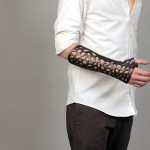In case you were living under a rock, Ebola’s the latest epidemic that’s got the whole world terrified. It’s very near reached pandemic proportions over in West Africa, where it’s sweeping through the population like some terrible plague. Though the developed world has seen only a few sparse cases of the illness, the West African mortality rate is terrifyingly high. Understandably, none but the most courageous of doctors and medical professionals are even willing to set foot near an Ebola outbreak, let alone make an effort to treat it.
After all, Ebola is highly contagious, and even one slip up, and you’re infected.
Naturally, that got scientists thinking – why not send a robot to do a the job instead? Next month, there’ll be a simulcast workshop designed to test a new line of medical telepresence robots. If all goes as planned, these devices will ship out to West Africa shortly after. Included in this arsenal of medical machines would be automated medical supply delivery drones, telepresence robots to take the place of interpreters, and decontamination devices designed to disinfect and bury the dead.
Now, given the dire straits within the quarantine zone, the scientists don’t necessarily have time to make their robots perfect. For that reason, the first wave they send out is likely to be more than a little slapdash; cobbled together as quickly as possible in order to bring relief to countries suffering under the yoke of the epidemic.
“We are not trying to come up with a brand new design because I don’t think we have time for that,” explained Worcester Polytechnic Assistant Professor of Robotics Engineering Taskin Padir. “I’m trying to repurpose some of the standard designs we have. We want to be able to deploy something within three months. I can’t design brand new robots that would take a year to figure out.”
Padir and his colleagues will meet in a teleconference on November 7 in order to decide how they should proceed, and what route they should take to deliver aid as quickly as possible. One of the experts, Robin Murphy, believes the conference needs to answer two questions in order to be considered successful: what they should do now and what they can do in the future. According to Murphy, this epidemic will be long over by the time we can develop advanced care droids to tend to the sick – the most we can hope for is that they manage to design a fleet of machines that can be dispatched the next time a pandemic strikes. [lead image courtesy: salford institute for dementia]




